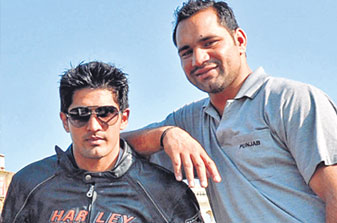 New Delhi, Mar 10: Hours after confessing to have met drug dealer Anoop Singh Kahlon and purchasing heroin from him, boxer Ram Singh has now admitted that he and star boxer Vijender Singh took drugs thinking it was food supplement.
New Delhi, Mar 10: Hours after confessing to have met drug dealer Anoop Singh Kahlon and purchasing heroin from him, boxer Ram Singh has now admitted that he and star boxer Vijender Singh took drugs thinking it was food supplement.
According to sources, during questioning, Ram Singh told Punjab police officials that he and Vijender mistook drugs for food supplement.
The police is yet to question Olympic medallist Vijender Singh in the case.
Ram Singh told the police that he and Vijender Singh bought heroin from drug dealer Anoop Singh Kahlon. Ram Singh said he and Vijender Singh are not habitual users.
Ram Singh said he and Vijender had met drug dealer Anoop Singh Kahlon 3-4 times since December.
Olympic medallist Vijender Singh got a nasty punch on Friday after being linked to a Rs 130 crore heroin haul and cops said the suspects included his friend and sparring partner, national level boxer Ram Singh, who was detained and interrogated by Punjab police.
The Beijing bronze medal-winning boxer immediately denied any links with suspected druglord Anoop Singh Kahlon, accused of stashing 26kg of heroin in an apartment in Zirakpur, on the outskirts of Chandigarh. Cops raided the apartment after getting information from Kahlon, who was arrested on March 3. He told cops that he knew the champion and Ram Singh.
Singh was detained and questioned by the police on Friday after it was found he drove Vijender's Ford Endeavour to Kahlon's Zirakpur apartment, where the keys to the boxer's SUV were found. The Endeavour is registered in Vijender's wife's name.
In all, 26kg of heroin was recovered in two consignments, including 16 kg in the flat belonging to the Canadian NRI and drug kingpin Kahlon late on Thursday. Another 10kg of drugs was found in a Hyundai Accent, belonging to Kahlon, parked outside the flat. Kahlon and his accomplice Rocky were arrested by the police from neighbouring Fatehgarh Sahib district on March 3 on drug trafficking charges.
"We've not yet established the role of either Vijender or Ram Singh," said senior superintendent of police Hardyal Singh in Fatehgarh. "But we can confirm that both Vijender and Ram knew Kahlon and his accomplice, Rocky. We have evidence of this, but we cannot disclose this now," he added.
Ludhiana DIG MH Farooqui told reporters, "Many sportspersons have figured in drug rackets in the past. In this racket, too, some sportspersons are involved. Even Kahlon is a former shot putter."
Vijender, a DSP rank officer with Haryana police, denied links with Kahlon. "I do not know the person in question and I am not involved with him in anyway. I may have met him but don't know him personally or directly."
The 27-year-old middleweight boxer said he had lent his SUV to Ram Singh, who shares his room at the National Institute of Sports (NIS) in Patiala. Ram Singh is a Punjab police head constable.
"My name is unnecessarily being dragged in this drug smuggling scandal," Vijender said. "TV channels are talking about the car link but nothing was recovered from it. I was in Mumbai for two days when the raid took place and my wife Archana had dropped me at the Chandigarh airport on Tuesday. The car is registered in her name and sometimes my friends in boxing circles use it when I am away," Vijender told TOI on Friday.
Asked why his SUV was parked outside the flat in Zirakpur, Vijender said, "Ram Singh is a good friend and helps me in training. He took the keys in my absence. I tried calling him after learning about all this but his phone was switched off. I meet a lot of people who can claim to know me. I have never done anything wrong. I am ready for an investigation. I am sure the truth will come out," he said.
Four people including Kahlon have been arrested so far. SSP Hardyal did not confirm if there was recovery of drug from Vijender's SUV.
However, in separate recoveries, SSP Hardyal said cash worth Rs 1 crore, Rs 8.7 lakh, and drugs used in rave parties were recovered. "These are separate recoveries. The fresh drugs are those used by celebrities in parties," he said.
When Vijender, who gave India its first Olympic medal in boxing in 2008, was asked if all this would affect his training, he said, "There will be slight distraction but then such is life, there are ups and downs."
Late on Friday, fresh drug recoveries and two more arrests took place: Two Mohali-based men, Manpreet Singh and Gabbar Singh, were arrested with Rs 1 crore cash and 20 kg of chemicals and 2 kg heroin on them. These raids follow Kahlon's questioning.
The police said Jagdish Bhola, a former Punjab Police cop and a wrestler, is the kingpin of the entire racket. There is a Delhi connection as well, as many of the drugs in fresh recoveries were meant for rave parties.





Comments
Add new comment